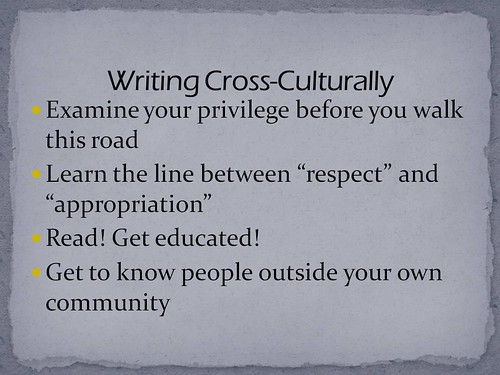Beyond Orcs and Elves, part 3
So now let’s talk about writing cross-culturally!
Writing Cross-culturally
A few months ago, I answered a reader’s question on my website, in which she asked, basically, “Is my character ‘black enough’?” which prompted a wide variety of responses, some voices expressing why the question itself hurt the readers, most particularly that the question comes with baggage that implies there’s only one way to be black. But much as it might be a painful process, with perhaps many mistakes made along the way, I think it’s important for us to be talking about writing cross-culturally. White writers have started to examine their privilege, have started to critically think about why they don’t include more diversity in their writing. So they start out with some incorrect ideas and a LOT of questions—and the way they ask the questions might not always be the best way to phrase something. Not to mention—getting back to that Le Guin quote that everyone has someone who is Other to themselves—that maybe black writers might be interested in Japanese culture, and East Asians might be interested in Indian culture, and all those intercultural interests that are so healthy for everyone to have.
It’s not the responsibility of your average POC on the street to explain Racism 101 to anyone who asks, and sometimes those responding have heard it ALL before. But there are ways for people who want to include a wider variety of people/cultures/ethnicities/races in their writing to figure out how to do so. In fantasy, sometimes it’s especially easy, because often our worldbuilding involves MAKING STUFF UP! If it’s not set in the real world nor directly influenced by it, why would everyone need to be white?
But then what about setting stuff in the real world, or in a world inspired by a specific culture, say, ancient China? That’s where research comes in. And as any writer knows, research means a number of different sources of information.
- Read! Get educated!
I know I’m going out of order here, but this really is one of the most important things someone who’s just starting out thinking about writing cross-culturally can do. And I don’t mean just walking up to a person on the street or a random work acquaintance and saying “so, tell me about you people.” If you don’t already know and trust someone from the culture you want to write about, ask yourself why that is—both that you want to write about it, and that you don’t know anyone. Then figure out how to fix the second part of that sentence. Find museums and cultural centers if you don’t know someone from that culture and ask them to point you in the right direction. It’s their job, at least, to field such questions, and it’s a better solution than asking the only black/Native American/Asian person you know. And besides, you can’t assume that if someone’s Asian, for example, that they’re from the culture you want to write about (BIG difference between Chinese/Japanese/Korean/other Asian cultures) or that they’d have any more experience than you do with it if they’ve lived here in the US their whole lives. They might. But they might not.
So USE YOUR LIBRARY. (Aside: Our libraries are under constant threat of budget cuts right now because of the economy. If you want to be able to keep using it as a resource—and you really should—make sure to also think about advocating for it in your communities/counties/states.)
- Examine your privilege before you walk this road
Normally at this point, I read parts of “Things I don’t have to think about today” by John Scalzi, an SFF author and the current president of SFWA. Rather than reproduce his blog post, I’d rather you go read it here in its entirety. It’s one author’s musings on his privilege, which I think will be a nice springboard thought exercise for anyone thinking about their own privilege—and most of us have privilege of some form, even if we’re from a poor background, even if we have health challenges, and so forth.
- Get to know people outside your own “community”
This one’s fairly self-explanatory. Reaching beyond our everyday patterns to befriend people who are different than us helps us to see a bigger picture and understand others’ perspectives, even if we don’t share them.
- Learn the line between “respect” and “appropriation”
Note to especially examine appropriation of Native American and other First Nations/Aboriginal cultures, whose voice has been suppressed/oppressed ever since Columbus over 500 years ago. I hear from a lot of people who want to use Native American beliefs (or often, what they believe are Native American beliefs, from a 70s-media-influenced point of view, conflating all Native American people into one spiritual-close-to-nature pot). But most Native Americans would probably rather see fantasy from other Native Americans because of their sensitivity to cultural appropriation from outsiders.
How do you know, then, whether you’re using a culture of inspiration appropriately? Nisi Shawl has a lot of great thoughts on cultural appropriation in her articles Appropriate Cultural Appropriation and Transracial Writing for the Sincere. I think the most important one from Appropriate Cultural Appropriation is the idea of the difference between Invaders, Tourists, and Guests. She says:
During the same panel which inspired Goto’s poem, audience member Diantha Day Sprouse categorized those who borrow others’ cultural tropes as “Invaders,” “Tourists,” and “Guests.” Invaders arrive without warning, take whatever they want for use in whatever way they see fit. They destroy without thinking anything that appears to them to be valueless. They stay as long as they like, leave at their own convenience. Theirs is a position of entitlement without allegiance.
Tourists are expected. They’re generally a nuisance, but at least they pay their way. They can be accommodated. Tourists may be ignorant, but they can be intelligent as well, and are therefore educable.
Guests are invited. Their relationships with their hosts can become long-term commitments and are often reciprocal.
I think those are important distinctions. You may start as a Tourist, but learn enough and you might be invited as a Guest. But it’s an invitation that comes from the host—you can’t demand an invitation. But I think the occasional outsider writing as Tourist, as long as you’re learning, is an important part of this step of the process we’re in, working to build awareness and bring out more SFF books for young readers that feature POC.
But go read BOTH articles! Both have more to say than I can express here without just repeating what she already said so well.
And I really don’t have much more to say on how to write cross-culturally. Really, what I’d like you to take away from this for your writing is to consider who the readers are, where they come from, the issues involved in reaching all readers and potential readers, and then for you to become advocates for diversity in whatever way is appropriate for your writing. But let me leave you with this thought on appropriation from Ursula K. Le Guin from that same book, The Language of the Night:
“If you deny any affinity with another person or kind of person, if you declare it to be wholly different from yourself—as men have done to women, and class has done to class, and nation has done to nation—you may hate or deify it; but in either case, you have denied its spiritual equality and its human reality. You have made it into a thing, to which the only possible relationship is a power relationship. And thus you have fatally impoverished your own reality. You have, in fact, alienated yourself.”
And for those wanting more reading, check out these links:
Resources For Writers: Writing About Another Culture
Nisi Shawl’s Writing the Other—both a workshop and a book. More info at http://www.sfwa.org/members/shawl/other/
“Appropriate Cultural Appropriation” by Nisi Shawl http://www.irosf.com/q/zine/article/10087
“Transracial Writing for the Sincere” by Nisi Shawl http://www.sfwa.org/2009/12/transracial-writing-for-the-sincere/
Le Guin, Ursula K. “American SF and the Other,” The Language of the Night. New York: HarperCollins, 1979/1989.
Le Guin, Ursula K. “Why Are Americans Afraid of Dragons?” The Language of the Night. New York: HarperCollins, 1979/1989.
“Being Poor” by John Scalzi http://whatever.scalzi.com/2005/09/03/being-poor/
“White Privilege: Unpacking the Invisible Knapsack” by Peggy McIntosh http://www.nymbp.org/reference/WhitePrivilege.pdf
“Things I Don’t Have to Think about Today” by John Scalzi http://whatever.scalzi.com/2010/10/18/things-i-dont-have-to-think-about-today/ paired with his next post on narrative usurpation, covering why he wrote the previous post, at http://whatever.scalzi.com/2010/10/18/narrative-usurpation-quick-thoughts-on-the-previous-post
Teen blogger Ari’s Reading in Color blog, which reviews only books by and about people of color: http://blackteensread2.blogspot.com/ She’ll give you plenty of places to start reading if you’re just starting out—and really anytime you might be stuck and wanting more to read.
Color Online focuses on women POC writers and books for POC teen girls, including a local library one of the bloggers runs for teens in her area. They often run reading challenges to get their fellow bloggers reading and thinking about POC in children’s/YA books, though they don’t limit themselves to children’s books. http://coloronline.blogspot.com/
Doret runs The Happy Nappy Bookseller, where she reviews books about POC and raises awareness, sometimes doing features on particular themes. http://thehappynappybookseller.blogspot.com/
And the obligatory last slide for more info about me—which of course you already know if you’re here!


Very good advice!
Thank you so much for writing this!
Good stuff! I’d have preferred it if you’d quoted/gone a little deeper in the section on examining privilege, but it’s a great and useful post for many of us out there.
As I said at the beginning, this was for a speech, and there was limited time. But it’s a topic that does deserve more delving, so I’ll note it for future posts.